I Thought I Wasn't Good At Saving Money, But Doing These 10 Things Changed My Mind
I never thought I was particularly great at saving money, but ironically, I was always pretty good at trimming my expenses and finding unique ways to cut costs. This inevitably led to me finding extra money to put toward a rainy day fund.
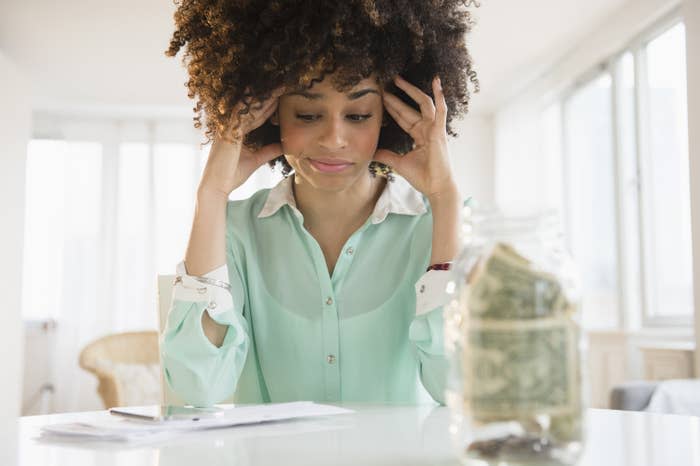
It doesn't have to be hard, it's all about developing financial habits that helped me save over time. So, instead of saving at random for a rainy day, here are 10 strategies I used to build up an emergency fund that was well-stocked:
1.I stopped taking advice from people who hadn't already accomplished what I was trying to do.
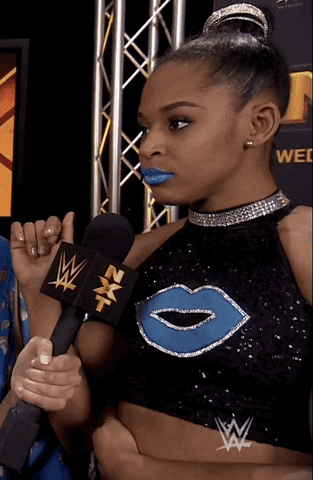
USA Network / Via media.giphy.com
Once you start to share your financial goals with others, it's only natural you'll get everyone's opinions on it. Early on, I made it a point to understand the difference between someone's financial opinion and actual educated financial advice.
It's always a smart idea to learn from others, but it makes even more sense when they've actually achieved success in the area you want to conquer. Once I honed in on this key principle, I chose only experienced advice that could get me ahead.
Furthermore, it's especially pertinent to seek financial advice from those who are nearly one or two steps ahead of you in your financial journey. So often we hear from experts who are millionaires 10 times over, yelling at you to ditch the avocado toast and Starbucks coffee. However, I've found the best and most relatable advice has come from those that were right where I was, not too long ago.
Bottom line, at some point, you will find that you'll need to break away from the unhelpful advice from those you may know well and start taking charge of your financial future. Instead of relying on people who don't have a proven track record, seek out those with firsthand knowledge. Do the research needed to separate mere "opinions" from legitimate expertise.
2.I took into account the opportunity cost. When you do ANYTHING, there is a cost...
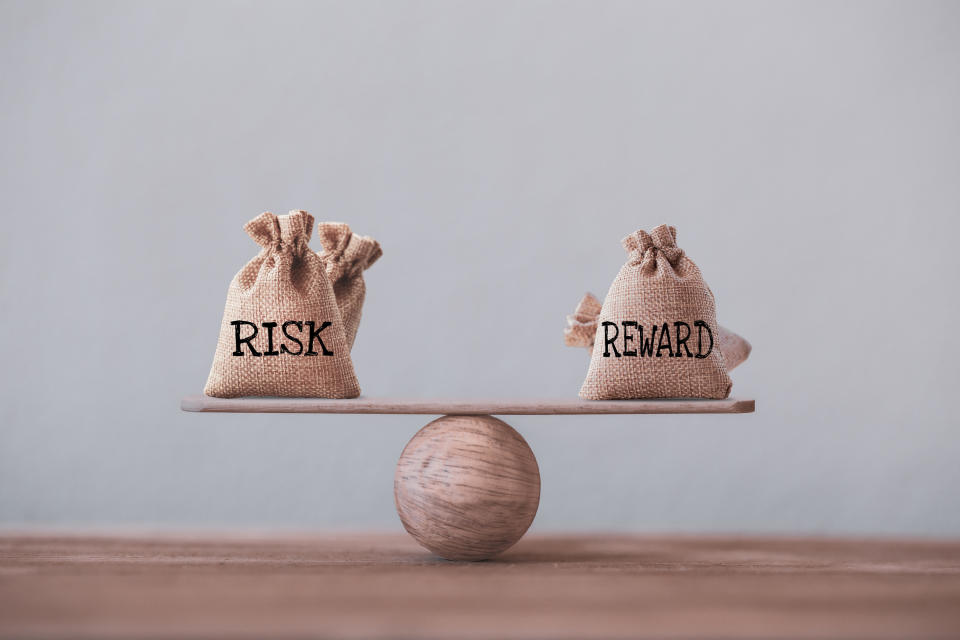
If I chose to upgrade my iPhone instead of putting money away into an emergency fund, what would be the opportunity cost? What other things could have been done with the extra money that is now being used for the purchase of the latest iPhone? As you weigh your spending options, consider the cost of opportunity.
This kind of thought process allowed me to factor in what else I could be doing with my money, and I started to make a mental list of all the things I no longer would buy for the time being.
3.I wasn't afraid to get my hands dirty or get paid to do tasks others thought they were too good for.

Warner Bros. / Via media.giphy.com
One of the biggest things that helped me save money was learning a variety of skills. There's always a task someone doesn't want to do and someone willing to pay for it.
So, I learned how to set rates for freelance writing, developed side-hustle strategies that allowed me to make the most money in the shortest amount of time, and taught myself how to edit video. Whether it’s freelancing, side hustles, or odd jobs, taking on additional work and directly depositing that extra income into a rainy day fund was a game-changer.
4.I automated my savings and investments, not my expenses.

Setting up an automatic transfer from my checking account to my emergency savings helped me save without having to think about it. It's the concept of paying yourself first. I started small and increased it as my budget allowed.
Instead of stressing over how to save more, I created a passive way to fund my rainy day account — taking a hands-off approach to saving allowed my emergency fund to grow on autopilot. Just by doing a direct deposit of $50 from each paycheck into savings allowed me to make progress without much effort.
As I became accustomed to living on less than I made, I started to apply this same principle to my investments as well, scheduling a dedicated amount to come out of my paycheck before it hit my checking account really forced me to spend what I had leftover wisely. And as my income grew, so did the habit of mindful saving.
5.The minimalist approach to budgeting worked for me.
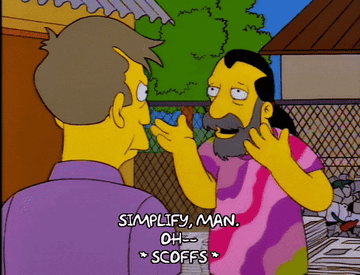
Fox Broadcasting Company / Via media.giphy.com
From spreadsheets to budgeting apps, I tested a variety of methods; however, I found the one that stuck with me most was just a plain old spending list. There's nothing more satisfying than constructing a list of monthly expenses deducting the total from your take-home pay and then checking off those expenses as you pay each one.
That began the process of assigning certain expenses to different bank accounts. This strategy tricked my brain into getting used to seeing only what was left to spend after all my primary expenses and savings had been accounted for.
6.I readjusted my budget when I found myself pinching pennies.
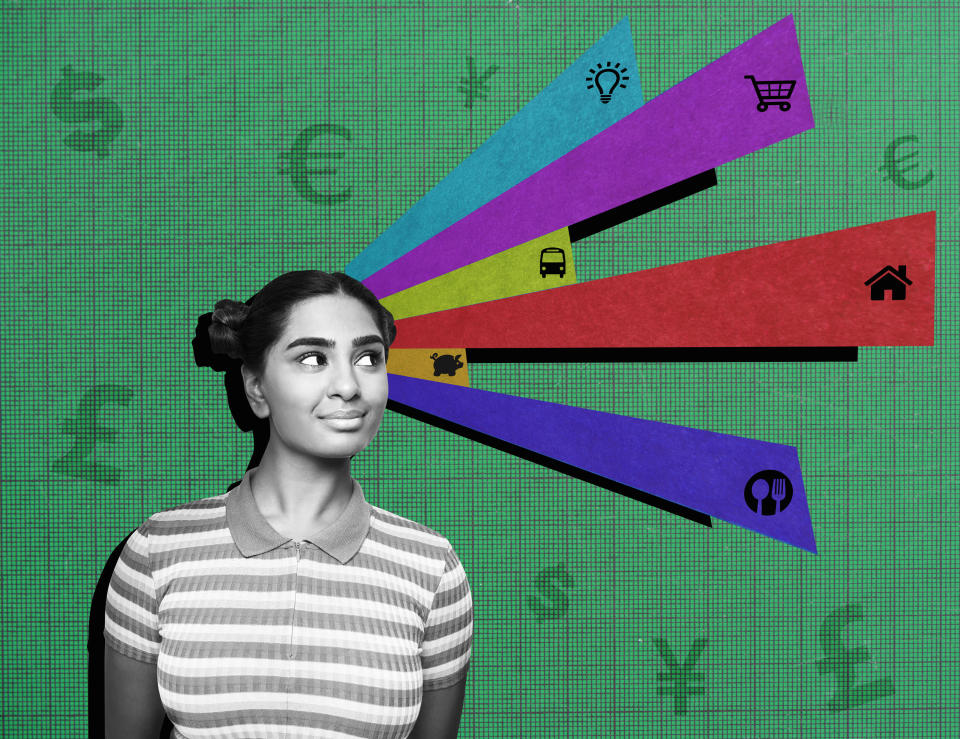
Realizing that I was repeatedly overspending in the same budgeting categories each month, it was clear that my budget desperately needed an upgrade. A quick reassessment revealed how certain categories like rising gas prices and inflation in my grocery budget left me with a spending plan that was way out of touch with reality and no money left over to put toward emergencies.
So, I began applying these three questions to every line item in my budget: How often do I use it? Can I find this someplace cheaper? Do I need it?
I came to the conclusion that paying attention to how many grams or ounces something has vs. just comparing prices can double longevity, ordering groceries online instead of in-store with curbside pickup was a game-changer, and leveling with myself that Amazon Prime wasn't really a priority. This offered a better perspective of my finances, which enabled me to forecast future expenses without worrying about immediate payments.
7.I took advantage of ALL the national emergency financial assistance program relief options of 2020.

Giphy.com / Via media.giphy.com
For independent contractors or small business owners such as myself, during the COVID-19 lockdown, there were several disaster relief programs available. The Paycheck Protection Program (PPP), Small Business Administration (SBA) relief funds, and State unemployment assistance programs all helped bridge my income gap during business and restaurant closures and allowed me to get caught up on business expenses. This gave me breathing room to free up some additional cash to stash away for a rainy day.
8.And yup, you guessed it...I took advantage of ALL the Federal Student Loan Moratorium relief benefits, too!

As a result of the global pandemic, a student loan moratorium was put in place for all federal student loan borrowers, offering a suspension of loan payments at 0% interest as well as stopped collections on defaulted loans under the Coronavirus Aid, Relief, and Economic Security Act (CARES Act).
In addition, the Public Service Loan Forgiveness (PSLF) limited waiver offered federal student loan borrowers who work in the public sector a second chance at loan forgiveness by allowing borrowers to receive credit for forgiveness for past periods of repayment that would not otherwise have qualified under the original terms of Public Service Loan forgiveness.
The suspended $0 payments continued to qualify me for PSLF, therefore maximizing the amount of student loans I was able to get forgiven. It goes without saying that this benefit alone saved me thousands of dollars.
9.I reduced my carbon footprint.

giphy.com / Via media.giphy.com
Before I continue, let's just acknowledge that there is an inherent privilege in being able to decide to take public transportation one day or personal transportation the next. With that being said, I do have the luxury of choice, and after evaluating fuel prices along with inflation for parts and labor costs, I have decided that my vehicle will only be utilized when it yields a profit for me.
Commuting to work via public transport costs me only $1.25 per day for the typical 5-day week, totaling just $6.25. For 22 days of public transportation to get to work, that adds up to less than $30 a month. If I were to drive, I'd spend $30 a week on gas alone. However, if I'm doing food delivery, I'd use my car; just doing four hours of food delivery a day can earn me anywhere from $30 to $50 a day in additional side income; therefore, I'm essentially paying myself to drive.
10.And finally, I capitalized on tax advantages.
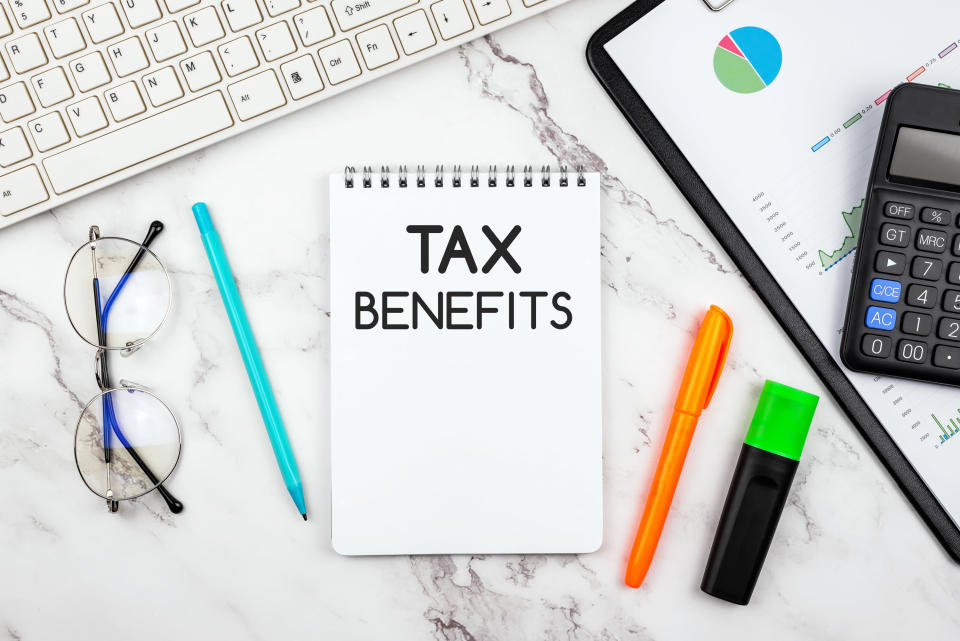
Get curious about tax law. Investing just a small amount of your time in learning about the different types of tax incentives you can qualify for will not only help to lower your overall taxable income but can also increase your chances of getting a higher tax refund. In fact, certain tax credits may give you a refund even if you don't owe any tax.
This is what inspired me to keep my side hustle as a DoorDash driver around just a little longer because it is viewed as a small business. And small businesses have business expenses they can report as tax write-offs. I've been able to deduct everything from car mileage, student loan interest, cellphone bills, and HSA contributions. These small tax breaks add up and have put a least $1,000 back into my pocket annually.
Just a few techniques and some creative evaluation of my lifestyle really helped to establish a substantial emergency fund that provides much-needed security in the event of an unforeseen eventuality. All it takes is being shrewd with even little decisions, and soon enough, you'll begin seeing money accumulating back into your pocket!
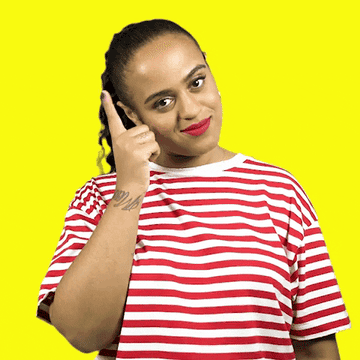
giphy.com / Via media.giphy.com

